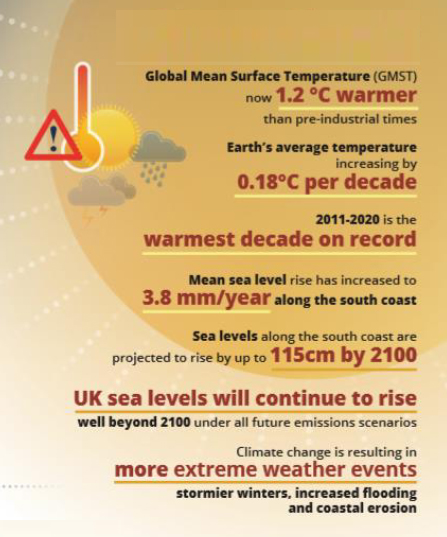Climate change, rising sea levels, population rise, poor water quality and the global biodiversity crisis all impact the fragile ecosystems of Chichester Harbour.
Here is a summary of some of the pressures on our harbour environment:

On the Water
Chichester Harbour is one of the busiest recreational boating harbours in Europe, with an estimated 25,000 people taking to the water each year to sail, boat and enjoy paddlesports. Being on the water brings important health and well-being benefits, but these activities can put pressure on the environment in a number of ways, including:
- Pollutants entering the harbour through the chemicals and scrub downs associated with anti-fouls as well as oils and fuels.
- Microplastics from maintenance or break-down of GRP and plastic boats.
- Disposal of sewage from boats.
- Disturbance of wildlife from the water.
- Damage to the seabed from anchoring and mooring.
On the Land
The shores of Chichester Harbour are a great place to spend time and important to the health and wellbeing of many people. Rising populations and increasing housing developments mean more visitors and increased pressures, including:
- Disturbance of wildlife from people and dogs.
- Trampling of habitats on the coastline (please stick to the paths!).
- Litter.
- Pollution affecting water quality, including from roads and waste-water treatment works.

How does sea-level rise affect coastal habitats?
We know that sea levels are rising. In a natural environment coastal habitats naturally migrate landwards to adapt to these changing conditions. But man-made constructions like sea walls stop this natural process. This means the habitats are squeezed or drowned out, resulting in the loss of valuable life-sustaining ecosystems including saltmarsh, intertidal mudflats, beaches, sand dunes and lagoons. This effect is known as coastal squeeze.
How is coastal squeeze impacting Chichester Harbour?
Natural England estimates that Chichester Harbour has lost 58% of the saltmarsh habitat since 1946 and that it continues to lose 2.54ha of saltmarsh per year (the size of 3 football pitches). Coastal squeeze is a significant factor contributing to this loss and its impact is predicted to increase as sea levels rise at an accelerating pace.
We urgently need to make space for saltmarsh and our other squeezed coastal habitats. Find out more about how we are doing this here.

Invasive Non-Native Species (INNS) are species of wildlife that do not naturally occur in specific regions of the UK (non-native) that have been introduced by the actions of humans and rapidly spread, out-competing native species (invasive). Only those that have serious negative impacts on our native species, our health or our economy are considered to be INNS.
There are a significant number of non-native seaweeds and marine animals that may be found in the marine environment including in ports and marinas, on boat hulls, on fishing gear and on natural shores.
Non-native species can threaten native species through competition for the natural environment, predation and disease. As a harbour user you can take action to reduce the risk of introducing and encouraging the spread of INNS is vital to protecting the biosecurity of the harbour and coastal environment.

As well as sea-level rise, climate change and rising global temperatures have led to more frequent extreme weather patterns and changes in water temperature and chemistry.
According to the UK Climate Projections (UKCP)the average temperature over the most recent decade (2009-2018) has been on average 0.3 °C warmer than the 1981-2010 average and 0.9 °C warmer than the 1961-1990 average. All the top ten warmest years for the UK have occurred since 2002. EU satellite monitoring shows that in 2024 Europe experienced the hottest summer on record.
Weather patterns are changing, showing a trend towards warmer, wetter winters and hotter, drier summers along with an increase in the frequency and intensity of extremes.
Along the coastline, UKCP predict that sea level rise will increase by up to 115cm in the South of England, relative to levels between 1981-2000. With this brings greater risk of coastal flooding from storm surges, and the height of high tides will increase.
Research also shows that rising sea temperatures impact on marine life, putting many species under stress, causing physiological changes which could have long-term effects on some species survival.
Within Chichester Harbour we are already witnessing the impacts of climate change and predictions indicate that this is only set to increase.
